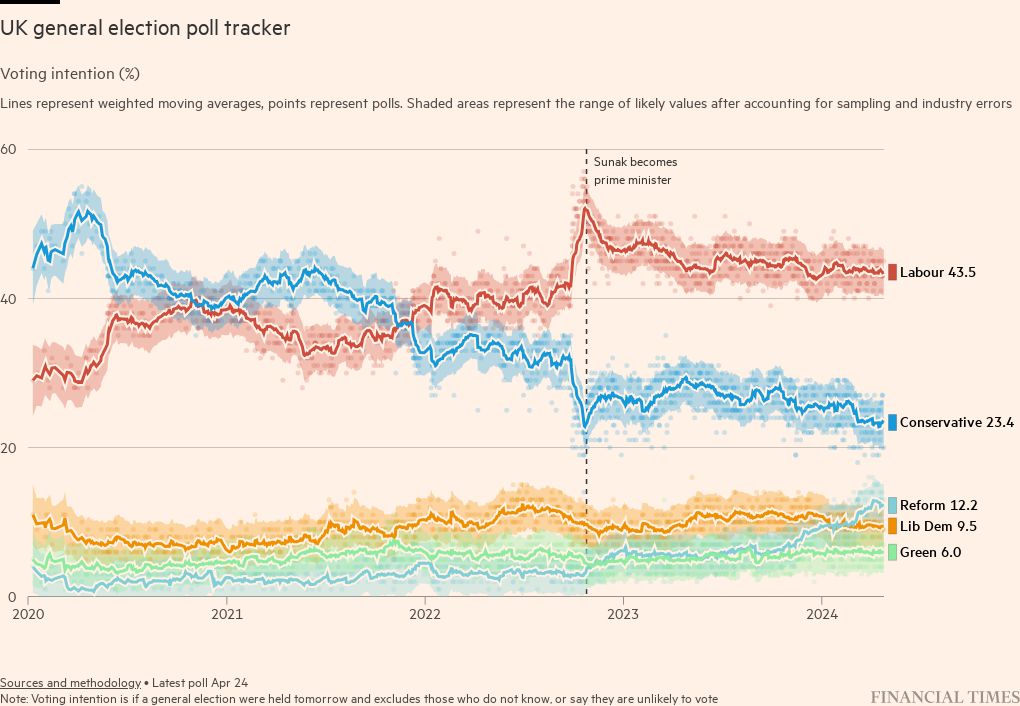Good morning. Theresa May has become the latest Conservative MP to announce plans to stand down at the next election. For all her premiership was overwhelmed by the pressures of negotiating Brexit, she has, I think it’s fair to say, generally been an exemplar of how to conduct yourself after leaving that office.
As home secretary she was a contradictory figure: she significantly expanded the reach and scope of Labour’s hostile environment policy, but on policing, she was the most reforming home secretary of modern times.
I continue to think that negotiating the backstop was a terrific diplomatic achievement and we’ll increasingly look back at the decision of various MPs to wreck it as a mistake.
But in the present day, her exit adds a note of gravitas to the sense that this era of Conservative politics is coming to an end. She was a key player in the party’s return to office having first been elected in 1997 and leaves it with the party on course for a similar defeat unless something changes.
One thing that could change it is a row over tax and spend. Some thoughts on that below.
Inside Politics is edited by Georgina Quach. Read the previous edition of the newsletter here. Please send gossip, thoughts and feedback to insidepolitics@ft.com
Fixing a hole
Most polls will tell you that, given a choice, people think the government should prioritise fixing the public services over cutting taxes. Ask most pollsters about what they think these numbers are actually telling us, and they’ll you it’s a bit more complicated than that.
Both the Conservative leadership and their Labour opposites think so too. Everything that Keir Starmer and Rachel Reeves say and do on tax and spend is predicated on the assumption that, sure, people like the idea of prioritising the public services more in theory, but in practice, at an election, this will only let the Labour party get so far. And everything that Rishi Sunak and Jeremy Hunt say on tax-and-spend is similarly based on that assumption too.
There’s another important difference between what the polls suggest and what the parties conclude: what voters say they think about policies in the abstract is different from what they think about them when they are attached to specific politicians or political parties.
Both the Conservatives and the Labour party bring a century of historical baggage with them: in different ways, what you might call their “brand identity” shapes how what they say and do is perceived and interpreted. That also determines how the two parties act.
That’s the important subtext to the latest row the two parties are having about the supposed “black holes” in each other’s plans.
At the start of the week, the Labour party had four major sources of additional tax revenue. They were going to strip private schools of their exemption from paying VAT, to extend and increase the windfall tax on energy companies, to abolish the “non-dom” tax regime, and to tax “carried interest” at the same level as income tax rather than as a capital gain.
These tax policies meant that Keir Starmer and Rachel Reeves could say that Labour’s various spending pledges were both a) fully funded and b) wouldn’t involve touching the politically contentious taxes, such as income tax, national insurance, fuel duty or VAT.
Jeremy Hunt nicked two of those revenue raisers in his Budget this week (the windfall tax and scrapping the non-doms’ regime) and is now trying to attack a third: Treasury officials, working to assumptions provided by Conservative special advisers, estimate that Labour’s changes to carried interest would actually decrease revenue overall, thanks to capital flight and behaviour changes. The department says the tax rise could cost the Treasury as much as £3.3bn in lost revenue if the policy is introduced in 2025 and runs through to the end of 2029.
Labour will use two things as its shield here: previous remarks by Nick Macpherson, former permanent secretary at the Treasury, that these estimates have “little if any credibility” because the assumptions that underlie them are set by special advisers. The party will also point out that until last week Rishi Sunak was saying the same thing about its windfall tax extension while Hunt was saying the same thing about the non-doms’ regime a little over a year ago. Plus, Labour is arguing that its sums are based on forecasts from the Resolution Foundation, an independent think-tank, while Treasury estimates are inevitably political.
In practice, I think it’s likely that Labour’s proposals here will go the same way as George Osborne’s flirtation in opposition with doing something similar with capital gains tax: in office, he opted not to do so in part due to concerns it would lose rather than raise revenue. The former chancellor increased CGT from 18 to 28 per cent in his first Budget for higher-rate taxpayers (though he cut it to 20 per cent in 2016, still higher than it was when the Conservatives came to office).
An opposition’s tax plans are by their nature somewhat impressionistic: Labour’s aim will be to give us all as favourable an impression as possible, while the Conservatives will want to paint as bleak a picture of Labour’s proposals as they can.
Labour also has an attack line of its own: arguing that Sunak and Hunt’s proposal to scrap employee national insurance contributions will create a £46bn black hole of their own.
This attack line is literally true, in that this is what it would cost to abolish NI, but not really I think a fair description of what Sunak and Hunt would actually do, which would be to merge NI and income tax. But again, the game here is that the Labour party wants to find any excuse it can to use the words “Liz Truss” as close as possible to the words “Rishi Sunak” and “Jeremy Hunt”, and talking about large holes in Tory plans is a good route to doing so.
Yesterday I asked you whether British voters had already decided on their party of choice in the next election. About 62 per cent of poll respondents said yes they had, 23 per cent said no, and 15 per cent were on the fence.
Now try this
I saw Frank Dupree play with the Philharmonia last night: I particularly enjoyed Borodin’s second symphony and Dupree’s interpretation of Kapustin’s fifth piano concerto, both of which I’ve added to the Inside Politics playlist. As we were leaving, I spotted that the BBC Radio 3 team were in the nearest box, so I’m looking forward to listening to it all again on March 19.
However you spend it, have a wonderful weekend.
Top stories today
-
‘Of course they take it away from us’ | Jeremy Hunt has wound down a scheme that delivered an extra £200mn a year for social housing in England, in a controversial move that will further squeeze the finances of cash-strapped local councils.
-
Cuts fears at MoD | The UK government has no “credible plan” to deliver the military capabilities it seeks and the country’s armed forces will have to cut some of their programmes unless overall defence spending is raised, according to a cross-party group of MPs.
-
Flight of fancy | Liz Truss spent more than £15,000 on in-flight catering for a single trip to Australia while she was running the Foreign Office in 2022, Politico’s Emilio Casalicchio reports.
Below is the Financial Times’ live-updating UK poll-of-polls, which combines voting intention surveys published by major British pollsters. Visit the FT poll-tracker page to discover our methodology and explore polling data by demographic including age, gender, region and more.
Recommended newsletters for you
One Must-Read — Remarkable journalism you won’t want to miss. Sign up here
Also Read More: World News | Entertainment News | Celebrity News









